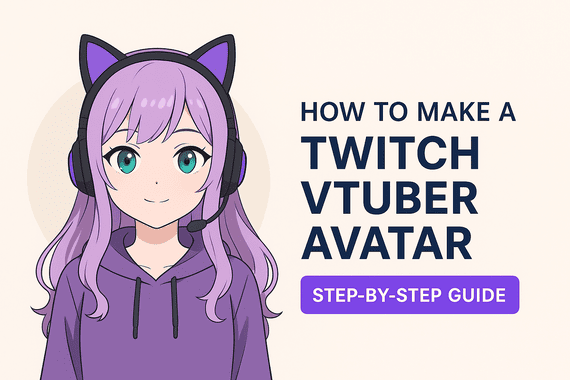How to Make a Twitch VTuber Avatar: Step-by-Step Guide


How to Make a Twitch VTuber Avatar:
Ever wanted to stream on Twitch without showing your face? That’s exactly where VTuber avatars come in. They let you express yourself with a virtual character that reflects your style, creativity, and personality. The best part? You don’t need to be a pro artist or spend thousands to make one. Let’s break it down step by step.
Introduction
What is a VTuber Avatar?
A VTuber avatar is a digital character that represents you while streaming. Instead of your webcam, viewers see your animated persona moving, blinking, and talking.
Why Every Twitch VTuber Needs a Unique Avatar
Your avatar is your brand. It’s what people remember you by—like a logo, but alive. A unique design helps you stand out in Twitch’s crowded VTuber space.
Planning Your VTuber Avatar
Choosing Your VTuber Style (Anime, Cartoon, Realistic)
Do you want your avatar to look like an anime character, a cartoon, or something more realistic? Your choice will shape your audience and vibe.
Deciding on 2D vs. 3D Models
2D (Live2D): Smooth, expressive, lightweight.
3D: More dynamic, allows VR use, but needs stronger hardware.
Defining Your Character’s Personality
Think of your avatar as a character in a story. Is it cheerful? Mysterious? Funny? Personality makes your avatar memorable.
Essential Tools for Creating a VTuber Avatar
Software for 2D Avatars
Live2D Cubism: The industry standard for rigging 2D characters.
VTube Studio: Runs your 2D model live on stream.
Software for 3D Avatars
VRoid Studio: Free and beginner-friendly.
Blender: For advanced 3D customization.
Animaze: Easy 3D avatar streaming integration.
Free vs. Paid Tools
Free tools get you started, but paid software unlocks pro features like advanced rigging and smoother tracking.
Designing Your VTuber Avatar
Using VRoid Studio for 3D Models
VRoid lets you design anime-style 3D characters without coding or 3D experience. Perfect for beginners.
Live2D for 2D Animation
Artists draw characters in layers, then rig them in Live2D to blink, talk, and move naturally.
Customization Tips to Stand Out
Pick unique color schemes.
Add accessories like headphones or glasses.
Give your avatar a signature detail (cat ears, glowing eyes, etc.).
Hiring Artists vs. DIY
Benefits of Commissioning an Artist
Artists deliver polished, professional results and unique designs tailored to you.
DIY Approach for Beginners
DIY tools like VRoid and Canva-style apps let you create avatars without art skills.
Average Costs in 2025
DIY: Free–$50
Artist Commissions: $300–$2000+ depending on detail and rigging.
Setting Up Your Avatar for Twitch
Face Tracking and Motion Capture
Apps like VTube Studio, Luppet, or Animaze use webcams or iPhones to track facial expressions.
Linking Avatar with Streaming Software
OBS Studio or Streamlabs helps you display your avatar on Twitch.
Testing Avatar Movements Before Going Live
Do a private test stream—make sure your avatar syncs well with your voice.
Optimizing Your VTuber Avatar for Twitch
Avatar File Size and Performance
Keep model sizes optimized; heavy files can cause lag during live streams.
Adding Expressions and Emotes
Extra expressions like angry, happy, or crying make your avatar feel alive.
Integrating with Overlays and Alerts
Match your stream overlays with your avatar’s theme for cohesive branding. Get eye-catching overlays, alerts from Stream Grafix.
Enhancing the Avatar Experience
Voice Modulation and Effects
Voice changers like Voicemod add extra character depth if you want to sound different.
Backgrounds and Scenes
Swap backgrounds for different vibes—cozy rooms, space stations, fantasy castles.
Using Props and Accessories
Add items like plushies, headphones, or swords to bring your avatar to life.
Content Ideas with Your New Avatar
Gaming Streams
Play trending games with your avatar reacting in real time.
Just Chatting Sessions
Hang out with your viewers, share stories, and bond.
Music and Creative Streams
Sing, draw, or create while staying behind your virtual persona.
Tips for Beginners
Start Simple, Upgrade Later
Begin with free tools, then invest as you grow.
Keep Your Avatar Recognizable
Don’t constantly change designs—consistency builds recognition.
Be Consistent with Branding
Match your avatar, overlays, and social media look for a strong identity.
Common Mistakes to Avoid
Overcomplicating Your Design
Simple avatars are often more memorable than overly detailed ones.
Ignoring Performance Issues
High-resolution models may look pretty but lag can ruin viewer experience.
Forgetting Audience Engagement
An avatar won’t save a boring stream—interact with your chat!
Future of Twitch VTubing in 2025
VTubing keeps evolving with AI, VR, and AR. Expect avatars with more realism, auto-animation, and even AI co-streaming features in the near future.
Conclusion
Making a VTuber avatar for Twitch doesn’t have to be overwhelming. Start small, experiment with tools, and focus on expressing your personality through your character. With creativity and consistency, your avatar can become the face of your Twitch brand.
FAQs
Do I need expensive software to make a VTuber avatar?
No, free tools like VRoid Studio and VTube Studio work perfectly for beginners.
How long does it take to create an avatar?
Anywhere from a few hours (DIY) to weeks (commissioning an artist).
Can I use a free avatar for Twitch?
Yes! Many apps offer free pre-made avatars you can customize.
Do I need to be an artist to make my own avatar?
Not at all—DIY software is designed for non-artists.
What’s the difference between a Twitch avatar and a PNGTuber?
A Twitch avatar moves and animates, while PNGTubers only swap between static images.
About
Stream Grafix offers premium Twitch overlays, alerts, and stream widgets. Crafted for creators who want to elevate their stream’s visuals and engage their audience.
© 2025 Stream Grafix. All rights reserved.

